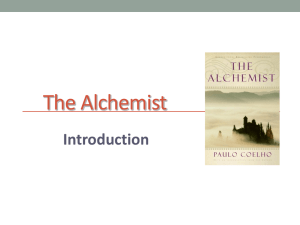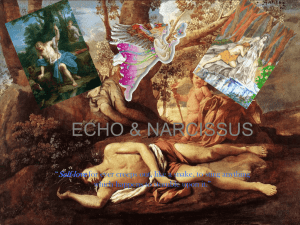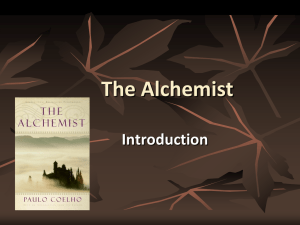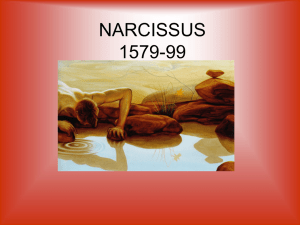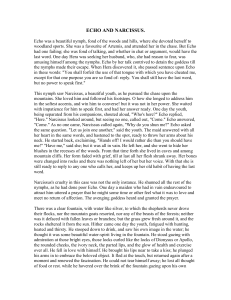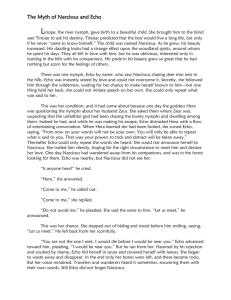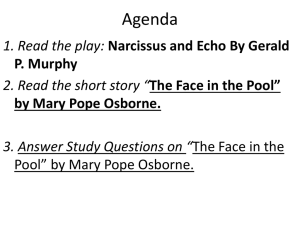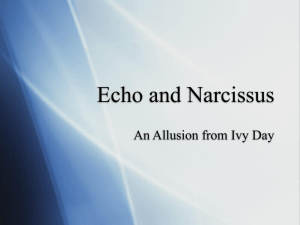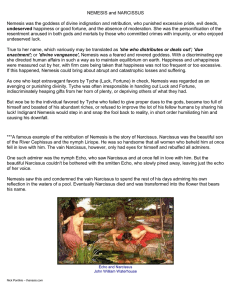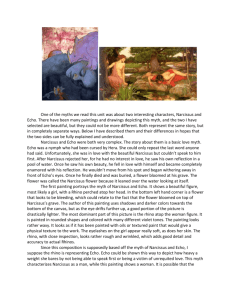The Alchemist - Mrs. McKinney English I/English I PAP
advertisement
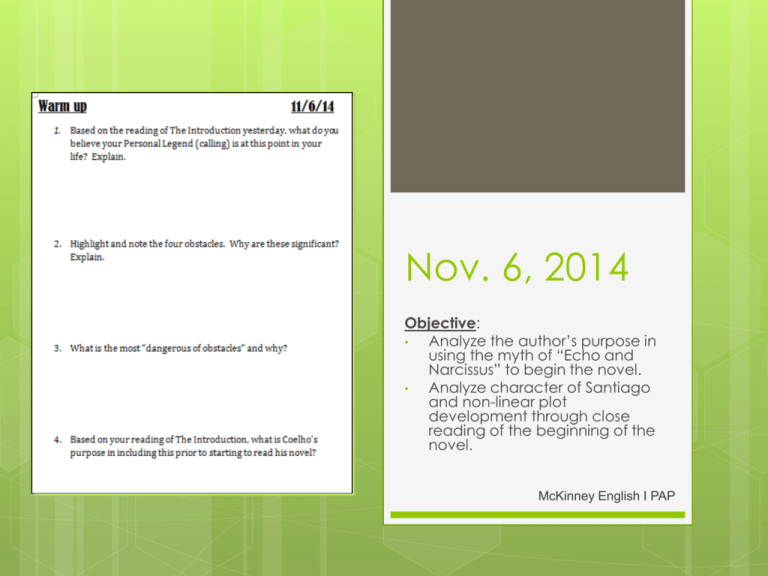
Nov. 6, 2014 Objective: • Analyze the author’s purpose in using the myth of “Echo and Narcissus” to begin the novel. • Analyze character of Santiago and non-linear plot development through close reading of the beginning of the novel. McKinney English I PAP The Alchemist By Paulo Coelho introduction The Alchemist is written in a fable format. What is a fable, and why would Coelho use it to tell his story? Generally speaking, fables use recognizable, simple characters and settings in order to illustrate a simple truth about life or human nature. What is it that Coelho attempts to teach? The Alchemist Even though you may not initially understand some of the unusual terminology in the story (Soul of the World, for example), its themes are ones which are probably familiar to you. The novel integrates ideas and philosophies of many faiths and historical periods. Many of these ideas concern the pursuit of truth, one’s intended destiny and the attainment of personal happiness. Coelho refers to these combined elements as one’s “Personal Legend.” Coelho tells the story of Santiago in order to teach us how we may find and live out our own Personal Legends. The Alchemist These ideas, though, have been explored since ancient times in one form or another by countless faiths and peoples. Hinduism, Buddhism, Islam, Taoism, Christianity, Judaism, countless tribal cultures, in addition to ancient and modern philosophers, all attempt to define the idea of one’s Personal Legend (though they may call it by different names), and all subscribe paths to achieving personal fulfillment. Thus, although the legend is about no faith or philosophy in particular, it is about all faiths and philosophies. Prologue What vain? Is does it mean to be vanity a good or bad quality? Echo and Narcissus Echo was a beautiful nymph, fond of the woods and hills, where she devoted herself to woodland sports. She had one failing: she was fond of talking, and whether in chat or argument would have the last word. One day Juno was seeking her husband, who she had reason to fear, was amusing himself among the nymphs. With all her talking, Echo detained the goddess until the nymphs escaped. When Juno discovered this, she passed sentence upon Echo in these words: “You shall forfeit the use of that tongue with which you have cheated me, except for that one purpose you are so fond of: reply. You shall still have the last word, but you shall have no power to speak first.” One day later Echo saw Narcissus—a young man whom the prophet Tiresias once said would “live to a ripe old age, as long as he never knows himself.” Echo immediately fell in love with Narcissus, and she followed him through the forests. Oh how she longed to address him and win him in conversation, but it was not in her power. She waited with impatience for him to speak first. “Who’s here?” Narcissus asked. “Here,” Echo replied. Narcissus looked around, but seeing no one, called out, “Come.” “Come,” Echo answered. “Why do you shun me?” Narcissus said. Echo answered the same question. “Let us join one another,” said the youth. The maid answered with all her heart in the same words and hastened to the spot ready to throw her arms around his neck. Narcissus started back, exclaiming, “Hands off! I would rather die than you should have me.” “Have me,” Echo said in vain. Narcissus left Echo heartbroken and she spent the rest of her life lonely and pining away for the love she never knew. Only her voice remained. Another time Narcissus became thirsty and went to drink from a lake. As he stooped down to drink, Narcissus saw his own image in the water. He thought it was some beautiful water spirit living in the fountain. He stood gazing with admiration at those bright eyes. He fell in love with himself. He brought his lips near to take a kiss. He plunged his arms into the lake to embrace the beloved object. It fled at his touch, but returned again after a moment and renewed his fascination. He could not tear himself away from the lake. He lost all thought of food or rest gazing only upon his own image. His tears fell into the water and disturbed the image. As he saw it depart, he exclaimed, “Stay, I entreat you! Let me at least gaze upon you if I may not touch you.” With this, and much more of the same, he cherished the flame that consumed him, so that by degrees he lost his color, vigor, and beauty which had formerly so charmed the nymph Echo. Echo, however, kept near Narcissus. And when he exclaimed, “Alas, alas,” she answered him with the same words. He pined away and died, and when his shade passed the Stygian river, it leaned over the boat to catch a look of itself in the waters. The narcissus flower is said to have sprung from the ground around the pool where Narcissus died. Prologue https://www.youtube.com/watch?v=o9okcHqdQd A Close Reading The Alchemist Close Reading - Pages 3-6 Directions: Annotate the beginning of The Alchemist for characterization (STEAL-labeled AND explained) of Santiago, imagery and diction (explain the purpose/connotation), and note the author’s purpose in using a flashback. Part I Complete reading of Part I by Friday, 11/7 Quiz - Friday
